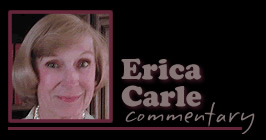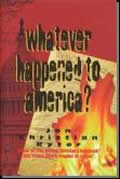Other Carle Articles:
Government
Religion In The
United States
The
Chamber Of Commerce:
It's Power And Goals
Control The Environment To Control Humanity
Universal Brotherhood And The Drive For World Unity
SOCIOCRACY--NOT FOR THE USA
PART 1 of 2
Erica
Carle
May 26, 2006
NewsWithViews.com
The word �socioCRACY� was coined more than 150 years ago by French mathematician/philosopher, Auguste Comte (1798-1857). Sociocracy was Comte�s concept of the ideal form of government for the future of the world. Comte also made up the terms, �socioLOGY,� and �socioLATRY.� He claimed sociology was a new science, �social science,� which would be the master science over all the other sciences, and also the science of managing people in groups. Sociolatry is the form of worship he invented to overtake and replace all the religions of the world. Comte also called his religion, Positive Religion, the Religion of Humanity, or Sociological Religion. The object of worship is humanity--all of mankind--past, present, and future conceived of as a single female organism. Comte called his god the Great Being, and himself the first High Priest of Humanity. He appointed his successor, and each High Priest thereafter was supposed to appoint his own successor.
In the fourteenth edition of the ENCYCLOPEDIA BRITANNICA Comte�s demand for total power was quoted as follows:
In the name of the past and of the future, the servants of humanity -- both its philosophical and its practical servants come forward to claim as their due the general direction of this world. Their object is to constitute at length a real providence in all departments,--moral, intellectual, and material. Consequently they exclude once for all from political supremacy all the different servants of God -- Catholic, Protestant, or Deist -- as being at once behindhand, and a cause of disturbance.
Sociocracy cannot succeed in its lust for power unless all other religions, particularly Christianity, and all other systems of government are destroyed. In his POSITIVE PHILOSOPHY , Vol.VI, Comte wrote:
Whatever is now systematized must be destroyed: and whatever is not systematized and therefore has vitality, must occasion collisions which we are not yet able accurately to foresee or adequately restrain. This will be the test of the positive philosophy, and and at the same time the stimulus to its social ascendancy. POSITIVE PHILOSOPHY, Vol. VI, P.411, 412.
Control begins with children, so control of education at all levels is demanded by the sociological priesthood.
The systematic direction of the education given to all classes alike rests solely with the priesthood, which thus obtains a basis for its consultative influence on the whole of human life, private as well as public. All of us have to work together for the continuous improvement of Humanity, but the noblest share in this work is specially reserved for the priesthood. SYSTEM OF POSITIVE POLITY (SPP), Vol. III, P. xxxii.
Everything we have belongs then to Humanity; for everything comes to us from her--life, fortune, talents, information, tenderness, energy, etc. . . The whole of the Positive education, intellectual as well as affective, will familiarise us thoroughly with our complete dependence on Humanity, so as to make us duly feel that we are all necessarily meant for her unintermitting service. CATECHISM OF POSITIVE RELIGION, P. 213.
Positive education places the emotions above the intellect. Comte was aware that people can best be organized and groupedby appealing to their emotions. He wrote:
. . . it is the primary condition of social reorganization to put an end to the state of utter revolt which the Intellect maintains against the Heart. . . Positivism has at last overcome the immense difficulties of this task. SPP, Vol. I, P. 285-287
Among the followers of Comte�s religion are sociocrats, sociologists, sociolatrists, positivists, humanists, Theosophists, Unitarians, communists, monopolistic capitalists, humanitarians, etc. They hope for, and work for a government by a worldwide sociocratic hierarchy. In 1906 in his book, APPLIED SOCIOLOGY, sociologist Professor Lester Ward explained sociological takeover of legislation :
It must not be supposed that such legislation can be conducted to any considerable extent in the open sessions of legislative bodies. These will doubtless need to be maintained, and every new law should be finally adopted by a vote of such bodies, but more and more this will become merely a formal way of putting the final sanction of society on decisions that have been carefully worked out in what may be called the sociological laboratory. P. 338
When laws are written by sociologists and positive priests, the idea of government �made for the people, made by the people, and answerable to the people� is no longer possible. Decisions are made behind the scenes long before proposals reach the legislative chambers. Legislators only duties are to love the Great Being, Humanity, and submit to her desires as determined by sociologists and Priests of Humanity..
Money to influence sociocratic education and legislation.has been available from multi-millionaires and wealthy industrialists since the mid Nineteenth Century. Comte promised benefits for certain wealthy benefactors that they could not resist. What benefit do the super wealthy derive from their support of sociocracy? First, it relieves them from feelings of guilt for greed and predatory business practices. Andrew Carnegie rejoiced when English sociologist, Herbert Spencer, freed him from worry about the wrath of God:
Andrew Carnegie records in his Autobiography how he chanced to read Darwin and certain works of Herbert Spencer, "I remember that light came as in a flood and all was clear. Not only had I got rid of theology and the supernatural, but I had found the truth of evolution.--All is well since all grows better--became my motto, my true source of comfort." Carnegie became one of Spencer's greatest American friends and through a lifetime of association showered him with kindnesses and admiration. THE GOSPEL OF WEALTH AND OTHER TIMELY ESSAYS by Andrew Carnegie Edited by Edward C. Kirkland; The Belknap Press; 1962; P. xi.
Even more important to certain multimillionaire industrialists and to the US and international Chambers of Commerce was the fact that sociocracy sanctioned political power and dominant positions to wealth and to wealthy families. On this subject Comte wrote:
In a settled state of society, Government, strictly so called, is a mere extension of civil influence. Ultimately, therefore, political power will fall into the hands of the great leaders of industry. SPP, Vol. I, P. 160.
The chief triumph of our species rests necessarily on the gradual substitution of the social for the personal character in the whole of our practical existence; the instrument by which it is effected being the steady concentration of Capital. SPP, Vol. II, P. 143.
Although individual eminence, be it physical, intellectual, or still more moral, forms the starting point of all temporal authority, superiority becomes permanent and complete only in those families which are capable of supporting others, by means of an adequate accumulation of capital. This material condition alone can dispose those who fill a dependent position to a habit of submission, a feeling which is soon ennobled by veneration. At the same time, the ruling families then satisfy their instincts for power, and this is gradually softened by goodness, when protection is duly appreciated on both sides. SPP, Vol. II., P. 145.
In the past century the power of money was used to introduce sociological religion into the schools. The following are a few examples of how this was done:
The Russell Sage Foundation, founded by the widow of the most notorious skinflint of his day, almost single-handedly created the profession of 'social work' with all its elaborate Freudian trappings. . . Nor did the Rockefellers at all impede the march of progress when they allowed Beardsley Ruml to spend $14,000,000 of Laura Spelman Rockefeller Memorial funds between 1922 and 1929 in order to put the social sciences on the academic map. THE FORD FOUNDATION Dwight MacDonald, Reynal & Company, New York, 1956, P. 24
In the 1920's and 1930's, fertile years in the development of American social sciences, most--perhaps all--of the direct funding for social science research came from private foundations... It was the foundations that gave the grants for individual scholars and sponsored and funded such critical research centers as the Brookings Institution, the Institute for Governmental Research, the National Bureau of Economic Research, the Social Science Research Council, and the Stanford Food Research Institute.
|
Subscribe to the NewsWithViews Daily News Alerts! |
During these decades, the Rockefeller Foundation and its partner, the Laura Spelman Rockefeller Memorial, invested about $100 million in the social sciences... There were in this prewar era other foundations helping the social sciences: the General Education Board, the Rosenwald Fund, and--most notably--the Carnegie Corporation... After World War II, foundation spending on social research grew steadily until the late 1960's; but in the same period the government's spending on research grew much faster, from $30 million in 1956 to $100 million by the mid-1960's to $524 million in 1980. -- "Social Science Research: Shifting Infatuation with A Critical Resource" by Marshall Robinson, FOUNDATION NEWS, Sept./Oct., 1983. P. 58. For part 2 click below.
Click here for part -----> 2,
� 2006 Erica Carle - All Rights Reserved
Erica Carle is an independent researcher and writer. She has a B.S. degree from the University of Wisconsin. She has been involved in radio and television writing and production, and has also taught math and composition at the private school her children attended in Brookfield, Wisconsin. For ten years she wrote a weekly column, "Truth In Education" for WISCONSIN REPORT, and served as Education Editor for that publication.
Her books are GIVE US THE YOUNG--$5 Plus $2.00 P&H WHY THINGS ARE THE WAY THEY ARE--$16 PLUS $4.00 P&H BOTH BOOKS -- $25 Total. A loose leaf collection of quotes titled, SIX GENERATIONS TO SERFDOM is also available--$15 Plus $2.00 P&H. Mailing address: Erica Carle; PO Box 261; Elm Grove, WI 53122.
E-mail: ericacarle@sbcglobal.net
Sociocracy cannot succeed in its lust for power unless all other religions, particularly Christianity, and all other systems of government are destroyed.










